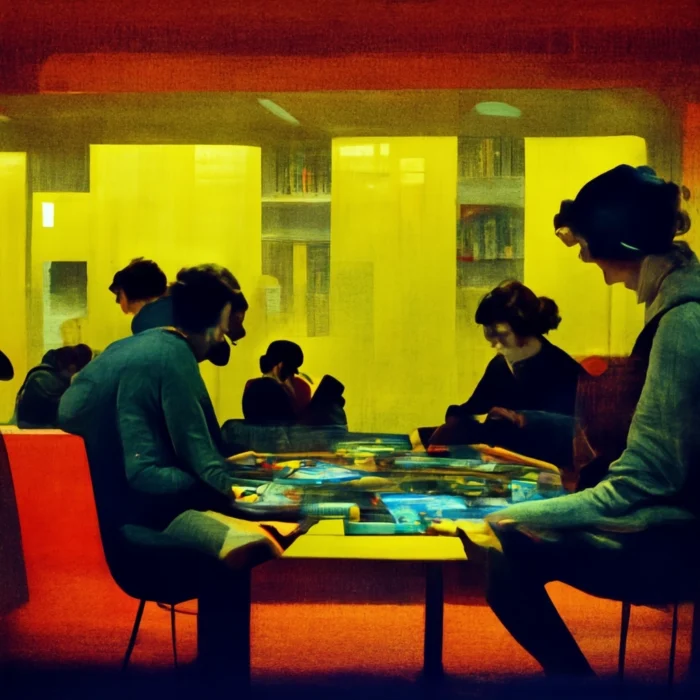
It turns out that trying to hold federal, state, and local elections, a local referendum, and a marathon all on the same day can be a disaster — even in a country where voter turnout can top 77% of the eligible population.
On Wednesday, the constitutional court of Berlin invalidated the state’s September 2021 election due to “election errors.” Those errors included long lines, polling place glitches, shortages of paper ballots, voters receiving incorrect ballots, and other issues. The state must now hold another election in the next 90 days.
In the aftermath of that somewhat chaotic election, one news publisher in Berlin partnered with a game design agency and public libraries to show the city’s residents there are ways to get involved in politics beyond voting. Der Tagesspiegel, one of the most popular German daily newspapers, has built an immersive, in-person game with the hopes that players walk away with an understanding of how their local governments work (and possibly pique their interest in participating in the real thing).
Tagesspiegel developed BVV-Planspiel, which translates to “experimental game,” in partnership with the German game design agency Planpolitik. The project is managed and funded by the city’s public libraries and, after an initial pilot phase, the partners plan to fully launch the game in the spring of 2023.
1/2 Welcher #BVV-Typ sind Sie? Bei einem neuen Planspiel können Interessierte in die Rolle von Bezirksverordneten schlüpfen und bei einem Online-Quiz mehr über die BVV erfahren: https://t.co/aGXMMmizWs pic.twitter.com/RyEMJ2Dwtg
— Corinna von Bodisco (@cora_vb) October 14, 2022
In Berlin, each district has its own local government known as the district council. Like local politics in many cities, the councils can be complicated and difficult to navigate even as they make consequential decisions on behalf of citizens. Monthly council meetings are open to the public, but can be jarring or confusing to first-time attendees if they don’t know how to participate.
As part of its local news coverage, Tagesspiegel has 12 daily newsletters; one per district in Berlin. In a city with roughly 3.5 million residents, Tagesspiegel has between 300,000 and 400,000 subscribers across the dozen newsletters. Tagesspiegel editor and newsletter reporter Corinna von Bodisco sees the game as a complement to that local reporting.
“On the one hand, [the newsletters] are very well read, and there are many active readers who know local politics,” von Bodisco said. “But the idea was to reach other people and also to create something where they can maybe develop their own ideas of how to participate in politics.”
Planspiel centers around the made-up Berlin district of Biberfelde. The game requires at least 10 players to serve as members of the district’s assembly and discuss a range of local issues. Each player is assigned to a fictional political party that’s loosely based on a real one. They get a short description of who they are, what kind of values and ideas they hold, and who their character represents.
At the end of 90 minutes, the players have to come to a resolution on the issue that serves the interest of the district’s residents. Hosting the game at public libraries — there’s one in each of the 12 districts — makes it accessible to all residents for free.
Some examples from the website include:
Judith Langowski, who was chief editor of newsletters for Tagesspiegel until October (she’s now a newsletters editor for Reuters), originally developed the idea with von Bodisco. Langowski was a 2019 grantee in the now-defunct Engaging Communities program at the University of Oregon’s Agora Journalism Center.
With the grant, Langowski and von Bodisco created a monthly newsletter focused on volunteering and community initiatives. They also developed a framework for what eventually became the Planspiel game. From there, Planpolitik worked with Tagesspiegel’s newsletter writers to develop the story lines, characters, and conflicts, all based on the journalists’ expertise covering their respective districts.
“It gives you a much better view on what politics on a local level is, instead of just reading about it or going to a meeting yourself and sitting in as a guest,” Langowski said. “When they have this rule [in the game] that they have to defend certain arguments, even though it might be the complete opposite [of your politics], they immediately fell into the structures that also existed in local politics.”
Langowski said that having this understanding of how local government works is essential and should be free to any Berlin resident who wants it.
“At this September 2021 election, I was in line to vote and a man behind me looked at the ballot for this district and he asked me ‘What is this?’” Langowski recalled.
“I said, ‘Oh, did you just move here?’ and he said no, that he had been living here for four years. It makes you realize how important this information is and how much is still missing,” she said.
Tagesspiegel piloted the game at one library last month. After that first simulation, von Bodisco said the players told her they wanted more time for discussion and a more diverse group to play with. The team behind Planspiel said they’ll make changes to address that feedback before the game launches to the rest of the library locations in 2023.